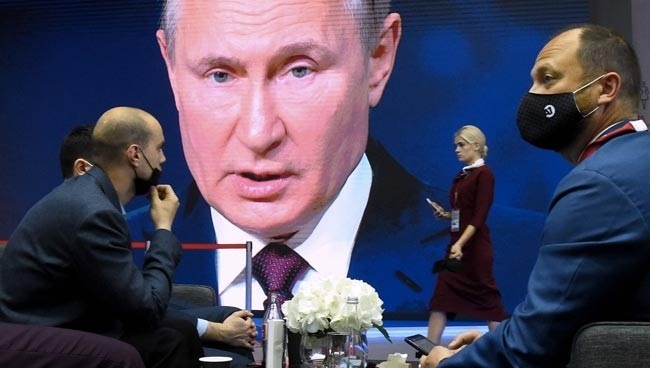| Translate This News In |
|---|
Vladimir Putin’s annual economic summit in St. Petersburg was always a hot ticket for Russian and foreign business tycoons looking to win favour with the Kremlin by holding extravagant parties or announcing large investments. His invasion has rendered Ukraine radioactive.
Many business leaders are anxious about even being seen at this year’s St. Petersburg International Economic Forum, fearing that it could make them targets for penalties, according to three people familiar with the situation, who declined to be identified because the topic is sensitive. At least two CEOs have stated that they intend to depart early to avoid attending Putin’s speech at the event, which has traditionally been the highlight for the well-connected.
According to the sources, some have urged the organisers, Roscongress, not to identify them on their badges for the June 15-18 SPIEF meeting. Roscongress did not react to comment queries.
Even as Russia faces unprecedented international sanctions that threaten the country’s worst economic downturn in decades, officials are projecting a business-as-usual approach for the 25th anniversary event, which will be held under the tagline “new prospects in a new world.”
The rivalry with the West, which has at times escalated to nuclear war threats, is barely mentioned on SPIEF’s website, however Western guests are advised to carry cash because sanctions mean Mastercard and Visa bank cards issued outside Russia will not operate there.
Russia utilised prior forums to “display the country’s success,” while corporate leaders could demonstrate their “connections and money,” according to Ekaterina Schulmann, a political scientist and fellow at Germany’s Robert Bosch Academy who moderated discussion panels at last year’s SPIEF. This year, “if local participants don’t all want to display their engagement, then international participants will,” claimed Schulmann, who has been dubbed a “foreign agent” by the Kremlin.
Before the war, Russian tycoons and state-run corporations competed by bringing in entertainers like Sting and Robbie Williams, whose “Party Like a Russian” song captured the opulent vibe of SPIEF’s late-night scene. Most of the same tycoons and companies are now sanctioned by the United States and the European Union, and few parties are scheduled this time.
Putin’s signature event once drew global political luminaries such as French President Emmanuel Macron, Chinese leader Xi Jinping, and Indian Prime Minister Narendra Modi. According to the Tass news service, this time it’s hosting an Afghan Taliban official, the investment minister from Myanmar’s military government, and the head of Venezuela’s central bank, all of which are strongly sanctioned countries.
Officials from Egypt, Turkey, the United Arab Emirates, and the Central African Republic, as well as former Soviet republics, are also in attendance. Nonetheless, the number of international representatives is a fraction of what has been seen at previous SPIEFs.
Despite their countries’ sanctions against Russia, SPIEF organisers name representatives of business organisations in Moscow representing France, Italy, Canada, and the United States as attending. A representative for the American Chamber of Commerce in Russia confirmed the organization’s involvement.
Putin made no mention of Russia’s “special military operation” in a greeting letter to participants, instead blaming “mistakes of Western countries” for rising global inflation, supply chain disruption, and food shortages.
However, most of SPIEF’s programming reflects what he called the “tough phase” in relations. Panels are dominated by Russian officials, with few foreigners, and tackle subjects such as safeguarding “national media sovereignty” and increasing consumer and business patriotism in import substitution initiatives.
Some previously significant names at SPIEF are lowering their profile. According to two persons aware with the situation, Russia’s largest lender, sanctioned state-run Sberbank PJSC, will not hold its annual party at the forum.
In a June 8 Telegram post, sanctioned billionaire Oleg Deripaska appeared to rule out his involvement, saying the topic was “fully decided.” “It’s time to reap the harvest,” said Deripaska, who frequently visits his native agricultural Krasnodar region in southern Russia.
According to SPIEF, one programme highlight will be Gazprom CEO Alexey Miller, who will participate in a session on the global gas market.
The forum’s exorbitant price tag of 960,000 rubles ($16,600) per person is leading some to avoid it because it makes less commercial sense with many multinational corporations no longer in attendance, according to officials from two major industrial firms.
“No senior executive from a foreign firm will want to be photographed this year at SPIEF,” stated Chris Weafer, CEO of Macro-Advisory Ltd. Travel restrictions to Russia are “a very convenient excuse for people who do not want to attend but do not want to damage bridges with the Kremlin.”


















